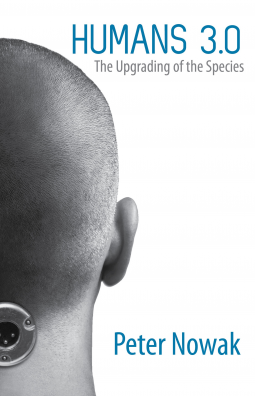
Humans 3.0
The Upgrading of the Species
by Peter Nowak
This title was previously available on NetGalley and is now archived.
Send NetGalley books directly to your Kindle or Kindle app
1
To read on a Kindle or Kindle app, please add kindle@netgalley.com as an approved email address to receive files in your Amazon account. Click here for step-by-step instructions.
2
Also find your Kindle email address within your Amazon account, and enter it here.
Pub Date Jan 06 2015 | Archive Date Jan 16 2015
Rowman & Littlefield | Globe Pequot/Lyons Press
Description
Our species is entering a new era. Millions of years ago, we created tools to change our environment. Caves became huts, fires became ovens, and clubs became swords. Collectively these tools became technology, and the pace of innovation accelerated. Now we’re applying the latest advancements to our own biology, and technology is becoming part of the process. But is that a good thing? Not if media scare pieces about government spying, limitless automation, and electronic addictions are to be believed. But veteran journalist and best-selling author Peter Nowak looks at what it means to be human – from the relationships we form and the beliefs we hold to the jobs we do and the objects we create – and measures the impact that those innovations have had and will have in the future. He shows not only how advancements in robotics, nanotechnology, neurology, and genetics are propelling us into a new epoch, but how they’re improving us as a species. Nowak has compiled the data and travelled the world to speak to experts. Focusing on the effects of technology rather than just its comparatively minor side effects, he finds a world that is rapidly equalizing, globalizing, and co-operating.
Peter Nowak is the author of Sex, Bombs, and Burgers, and his work has appeared in the Boston Globe, New Scientist magazine, and elsewhere. He won the Canadian Advanced Technology Alliance Award for excellence in reporting, and the Telecommunications Users Association of New Zealand named him technology journalist of the year. He lives in Toronto with his wife.
A Note From the Publisher
You are reviewing uncorrected page proofs. Quote only from finished book. Contact publicity@rowman.com with any questions. Thank you!
Advance Praise
Critical acclaim for Sex, Bombs, and Burgers:
“Hugely
entertaining. Nowak—an experienced journalist—confidently treads where
other historians of technology might avoid.” —THE NEW SCIENTIST
“An
enjoyable and informative history of the surprising origins of some of
the technological ‘marvels’ that underpin the modern world.” —BBC FOCUS
“Thought-provoking.
You can think of it, if you wish, as a modern version of Mandeville's
The Fable of the Bees, which proposed that society's vices are actually
good for overall economic health.” —THE GUARDIAN
“Witty and well-researched . . . An engaging read, leaving one with several ‘I did not know that’ moments.” —THE GLOBE AND MAIL
Marketing Plan
The official selection of Gary's Book Club for the 2015 Consumer Electronics Show.
The official selection of Gary's Book Club for the 2015 Consumer Electronics Show.
Available Editions
| EDITION | Paperback |
| ISBN | 9780762787005 |
| PRICE | $18.95 (USD) |
Average rating from 4 members
Featured Reviews
Technology journalist Peter Nowak takes us on a tour of technology’s recent history in an effort to illustrate the burgeoning epoch of a new age for mankind, aka Humans 3.0.
The writing in Humans 3.0 is clear and concise, with dashes of humor, and while the topic at hand is interesting enough, Nowak sticks to the more basic and obvious journalistic tracks of the present day. Rather than attempting high-levels of prognostication, he sticks to examples showing Moore’s Law in full effect, which states that computing power will double every two years, and although there is some early quoting of Ray Kurzweil’s prophecies on the singularity, such lofty, futuristic expectations take a backseat to the here-and-now.
Technology has obviously infiltrated every aspect of our lives, and Nowak examines the ways in which the digital age has shaped and altered our world, from globalization to movie production and the health industry, from the world’s economic growth to the rise of individual entrepreneurs who are able to forgo traditional publishing deals and embrace the indie mindset, and app developers and indie gaming gurus, like Minecraft developer Markus Persson and the forty-some employees who comprise the game development studio of Media Molecule, which produced the hit game LittleBigPlanet.
Nowak has clearly done an incredible amount of research, interviewing a variety of subjects from Kurzweil to AshleyMadison.com founder Noel Biderman, author Anne Rice, who is best known for her novel Interview with the Vampire, and even a South Korean Buddhist monk. This bit of effort pays off quite well and helps round out Nowak’s reportage with “in the field” sources. He also earns high marks for his adroit handling of topics involving privacy and the ways in which we have allowed technology to handle and parse many of our social commitments.
At only a little more than two hundred pages, the book is a quick read and Nowak’s prose is well-paced, and livened up a bit with quotes from his sources and stories of his own experience in writing this book. His efforts at trying to find the Media Molecule studio was a small bit of unexpected entertainment, revolving around how this studio created one of Sony Playstation’s biggest hits, and yet nobody, including staff at Electronic Arts and the studio’s neighboring train station, seemed to know where the heck these developer’s offices were at!
Humans 3.0 is a nice survey of recent technological history and the way it has shaped modern society, but it never feels terribly ground-breaking. While it’s interesting, at times even insightful an intriguing, and there’s plenty of neat facts to be gleaned throughout, the book’s primary audience is unlikely to be utterly wowed.
Additionally, I can’t help but think that the cover art, which displays the cybernetic infusion of Kurzweil’s singularity, is a bit misleading, as this topic is far from the book’s primary focus. This futurism-oriented art does a disservice to the writing, and causes a severe disconnect between what the product here actually is versus the way in which it is advertised.
If you’re looking for a predictive model of where humanity will find itself in the later years of this century, look elsewhere. However, if you’re seeking out a cogent examination of the way technology has influenced daily lives with some low-level educated guesses as to what’s on the horizon in another five years or so, Humans 3.0 should fit the bill nicely.
 Bill C, Reviewer
Bill C, Reviewer
Humans 3.0: The Upgrading of the Species by Peter Nowak looks at how technology affects what it means to be human, focusing both on the individual and how human interactions from the intimate to the national.
The points of discussion include how technology has increased economic and creative opportunities (he charts the explosive growth in picture taking with digital cameras, in writing via blogs and self-publishing, and in music via YouTube and other outlets), the way technology has allowed us to match food production to population growth, the impact on our health of new medicines and machines and how that impact might lead to greatly increased life spans, even including near-immortality via housing our consciousness in non-flesh containers. Nowak is definitely upbeat on these aspects, a little too much to be honest in my mind—in several places I made a note that I would have liked to have seen some critical pushback on some of the claims/analysis.
While the upbeat tone remains once Nowak shifts to the more social aspects, it is much more balanced by some less sanguine analysis, especially as it considers what appears to be a growing insularity and sense of loneliness among individuals. Nowak does a nice job at the end of placing this in a greater context, writing about how “we’re experiencing a technologically driven social dialectic” that will eventually converge. While most the writing is breezy and conversational, this section ups the complexity nicely.
Humans 3.0 is a slim, fast-paced, easy to read and follow overview that is mostly engaging and breezily written (with some nice humor at times, especially his hilarious attempts at finding a particular company’s headquarters). As mentioned, I would have liked more balance for the what I saw as overly optimistic views in the first half of the book, but I appreciated such push back in the latter half, as well as the more in-depth discussion that closes the book. Finally, I also appreciated his international approach, looking not just at the US or the Western world as is often the case in these works. Due to its slimness and somewhat basic approach, I’d consider it a good library pick up rather than a purchase, but its strengths certainly outweigh its weaknesses.
Readers who liked this book also liked:
Brian Azzarello; Chris Condon; J. Holtham; Stephanie Phillips; Jason Aaron; Tyler Crook; Matt Kindt; Corinna Bechko; Jay Stephens; Amy Roy
Comics, Graphic Novels, Manga, Horror










